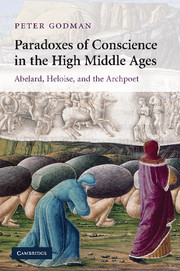Book contents
- Frontmatter
- Contents
- Preface and acknowledgements
- List of abbreviations
- 1 Moral moments
- 2 The neurotic and the penitent
- 3 True, false, and feigned penance
- 4 Fame without conscience
- 5 Cain and conscience
- 6 Feminine paradoxes
- 7 Sincere hypocrisy
- 8 The poetical conscience
- Envoi: Spiritual sophistry
- Bibliography
- Index of quotations
- General index
- CAMBRIDGE STUDIES IN MEDIEVAL LITERATURE
2 - The neurotic and the penitent
Published online by Cambridge University Press: 30 September 2009
- Frontmatter
- Contents
- Preface and acknowledgements
- List of abbreviations
- 1 Moral moments
- 2 The neurotic and the penitent
- 3 True, false, and feigned penance
- 4 Fame without conscience
- 5 Cain and conscience
- 6 Feminine paradoxes
- 7 Sincere hypocrisy
- 8 The poetical conscience
- Envoi: Spiritual sophistry
- Bibliography
- Index of quotations
- General index
- CAMBRIDGE STUDIES IN MEDIEVAL LITERATURE
Summary
The instruments of ethical analysis with which thinkers of the twelfth century probed fictio were bequeathed to them by their Christian heritage. Although sharpened and polished over the centuries, they appear blunt to sensibilities refined by the elegance of Greek religion. Their distaste for what is taken to be the smut of medieval superstition can be projected backwards and forwards, without regard to time or place, onto almost any work. One of them is the delightful De superstitione which that ‘Greek gentleman’, Plutarch, wrote probably between AD 95 and 115. A Middle Platonist prepared to concede the validity of faith in supernatural truth, he drew the line at certain forms of credulity. That line ruled out a case of ‘neurosis’ whom some call the penitent and others describe, ‘very roughly’, as ‘medieval man’.
Rough indeed is this image of a premature neurotic bursting onto the scene centuries before the curtain went up on the Middle Ages. Chronology swept aside by rhetoric, metaphor runs rampant. so it is that ‘medieval man’ can be defined as one ‘with a sense of sin, who walks in the Valley of the Shadow of Death’. ‘Fear of freedom’ is the motive for this lugubrious promenade, leading down to depths from which there is no ascent: ‘for the refusal of personal responsibility in any sphere, there is always a price to be paid, usually in the form of neurosis’.
- Type
- Chapter
- Information
- Paradoxes of Conscience in the High Middle AgesAbelard, Heloise and the Archpoet, pp. 19 - 43Publisher: Cambridge University PressPrint publication year: 2009



